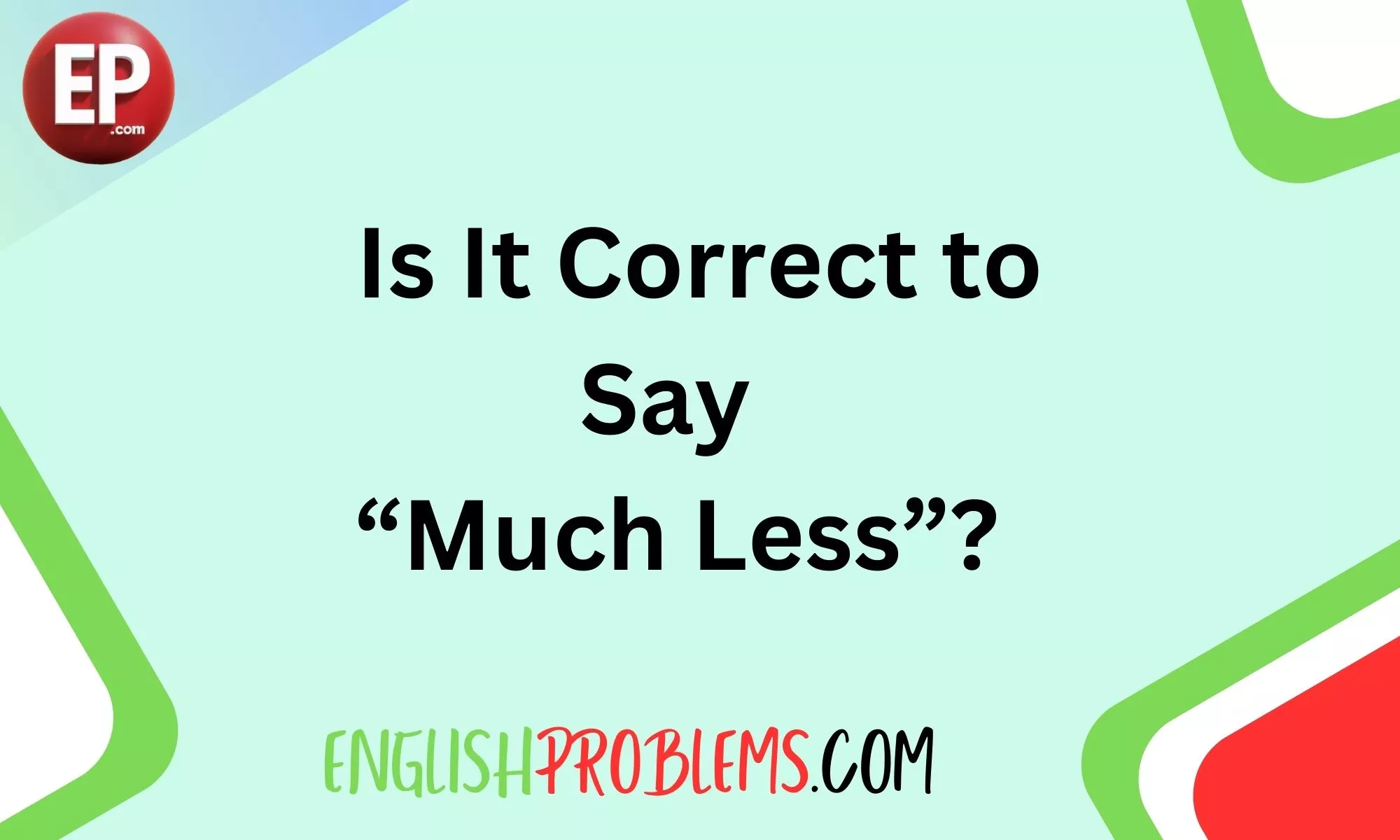Have you ever stumbled upon the phrase “much less” and wondered if you were using it correctly? This common expression in American English often confuses even seasoned speakers. Understanding the proper use of “much less” can significantly enhance your communication skills. In this comprehensive guide, we’ll dive deep into the meaning, usage, and nuances of this intriguing phrase.
Understanding the Phrase “Much Less” in American English
Definition and Meaning
“Much less” is an idiomatic expression used to emphasize the improbability or impossibility of something, especially in comparison to another thing. It can be used to highlight a contrast or to underscore a point more emphatically.
Origins and Evolution
The phrase “much less” has its roots in early English literature, where it was often used to convey emphasis in a more dramatic manner. Over time, its usage has evolved, but its core purpose remains the same: to underscore improbability or to highlight contrasts.
Exploring the Grammatical Uses of “Much Less”
Adverbial Use
“Much less” often functions as an adverb, modifying verbs to emphasize the extent of an action or state. For example:
- “She couldn’t afford a car, much less a luxury yacht.”
In this sentence, “much less” emphasizes the greater improbability of affording a luxury yacht compared to a car.
Conjunctive Role
As a conjunctive phrase, “much less” connects clauses to show a contrast or an additional point that is even more unlikely or significant. For example:
- “He can barely cook a simple meal, much less host a dinner party.”
Here, “much less” links two related ideas, emphasizing the greater difficulty of hosting a dinner party compared to cooking a simple meal.
Adverbial Use in Different Contexts
Formal vs. Informal Contexts
“Much less” can be used in both formal and informal settings, although it is more common in spoken language and informal writing. In formal contexts, it is often replaced by more precise or elaborate phrases. For example:
- Formal: “He lacks the resources to manage a project of this scale, let alone a more extensive one.”
- Informal: “He can’t handle this project, much less a bigger one.”
Written vs. Spoken Language
While “much less” is frequently used in spoken English, it also appears in written language, especially in informal communication, dialogue, and narratives. It adds a conversational tone and emphasizes points effectively.
Variety of Sentence Structures
“Much less” can be incorporated into various sentence structures, enhancing its versatility. Here are a few examples:
- Declarative: “She didn’t have time to finish her homework, much less start the new project.”
- Interrogative: “Can you imagine him running a marathon, much less winning it?”
- Exclamatory: “I can’t believe he forgot his wallet, much less his entire bag!”
The Conjunctive Role of “Much Less”
Connecting Ideas
“Much less” is a powerful tool for connecting ideas, especially when emphasizing a contrast or an extreme improbability. For example:
- “He struggles with basic arithmetic, much less advanced calculus.”
This use underscores the difficulty of advanced calculus in comparison to basic arithmetic.
Subordinating Conjunctions
As a subordinating conjunction, “much less” functions similarly to other conjunctions like “but” and “nor,” adding depth to sentences by highlighting contrasts. For instance:
- “She hasn’t read the book, much less understood its themes.”
Here, “much less” adds emphasis to the greater challenge of understanding the book’s themes compared to merely reading it.
Common Misconceptions and Mistakes with “Much Less”
Misuse in Everyday Language
Many people misuse “much less” by placing it incorrectly within a sentence or using it inappropriately. Common mistakes include:
- Incorrect: “She can swim, much less dive.”
- Correct: “She can’t swim, much less dive.”
The incorrect usage stems from misunderstanding the phrase’s emphasis on improbability or contrast.
Clarifying Confusion
To avoid mistakes, it’s essential to remember that “much less” is used to highlight something more improbable or difficult than the first item mentioned. Correct usage involves a negative or contrasting context. For example:
- “He can’t even boil water, much less cook a gourmet meal.”
Examples of “Much Less” in Everyday Language
Real-Life Examples
Understanding “much less” becomes easier with real-life examples. Here are a few from literature, media, and daily conversations:
- Literature: “The author barely had time to write the introduction, much less complete the entire manuscript.”
- Media: “The candidate hasn’t laid out a clear policy, much less a comprehensive plan.”
- Daily Conversation: “I don’t have time to clean the house, much less organize the garage.”
Analysis of Examples
Each example above uses “much less” to emphasize the greater improbability or difficulty of the second task compared to the first. This highlights the phrase’s role in underscoring contrasts and improbabilities.
Practical Sentences and Phrases
Creating Sentences
Here are some practical sentences using “much less”:
- “I can’t remember his phone number, much less his address.”
- “They couldn’t finish the report on time, much less present it.”
- “She didn’t enjoy the movie, much less recommend it to friends.”
Exercises for Readers
To practice using “much less,” try creating your own sentences. Here are a few prompts:
- Think of two related tasks, one easy and one difficult. Use “much less” to connect them.
- Write a sentence about a skill you don’t have and a more advanced skill you also don’t possess, using “much less” to link them.
Refining Your English: When and When Not to Use “Much Less”
Appropriate Usage
Use “much less” in contexts where you want to emphasize a contrast or an improbability. It works best in negative sentences or situations highlighting a significant difference. For example:
- “He can’t solve a simple puzzle, much less a complex one.”
Avoiding Overuse
While “much less” is a useful phrase, overusing it can make your writing or speech repetitive. Consider alternatives such as “let alone,” “not to mention,” or “still less” to maintain variety and interest. For example:
- “She couldn’t understand the basics, let alone the advanced concepts.”
Checklist for Usage
Here’s a handy checklist to determine when it’s suitable to use “much less”:
- Is there a clear contrast or improbability?
- Is the context negative or emphasizing a difficulty?
- Does the sentence structure support the use of “much less”?
- Have you varied your language to avoid repetition?
Conclusion
Summary of Key Points
In this article, we’ve explored the phrase “much less,” understanding its definition, grammatical uses, and practical applications. We delved into its role in different contexts, common misconceptions, and provided examples to clarify its use.
Encouragement to Practice
Applying what you’ve learned about “much less” can significantly improve your communication skills. Practice using the phrase in your writing and speech to become more confident and accurate.
Call to Action
Have you encountered any interesting uses of “much less”? Share your examples or ask questions in the comments below!
Additional Resources
Recommended Reading
- Books: “The Elements of Style” by Strunk and White
- Articles: “Common English Idioms and Their Meanings” by GrammarBook.com
Grammar Tools and Apps
- Grammarly: A comprehensive tool for checking grammar and style.
- Hemingway Editor: Helps simplify and clarify your writing.
Diagram/Table Suggestions
Table of Examples
| Correct Usage | Incorrect Usage |
| “She can’t drive a car, much less a motorcycle.” | “She can drive a car, much less a motorcycle.” |
| “He didn’t pass the test, much less ace it.” | “He passed the test, much less aced it.” |
| “They didn’t finish the project, much less present it.” | “They finished the project, much less presented it.” |
Flowchart for Usage
Hyperlinks and Sources
By understanding and correctly using “much less,” you can add clarity and emphasis to your communication, making your points more compelling and precise.

Nicholas Clark is a master wordsmith with a passion for unraveling the complexities of the English language. With a keen eye for detail and a love for grammar, he transforms tricky language issues into engaging and understandable lessons. Nicholas’s insightful articles make mastering English a delightful journey.










